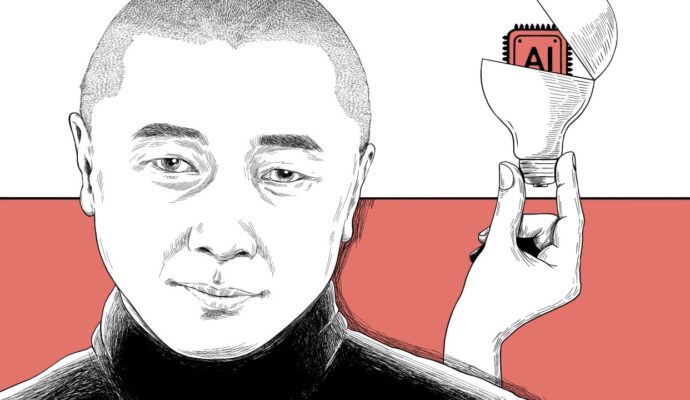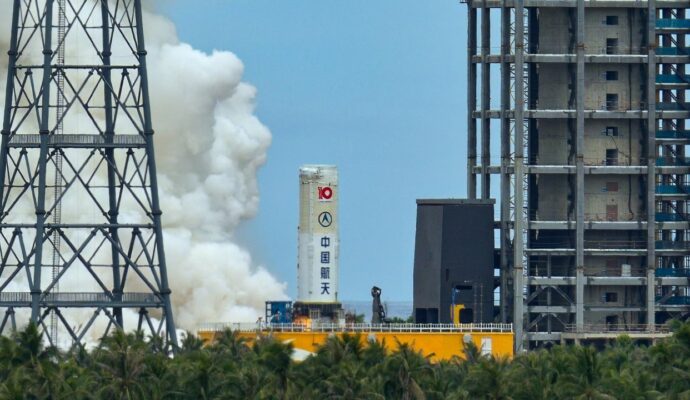Wang Fei-Ling, international affairs professor at the Georgia Institute of Technology, said the forum was “important” to Xi’s prestige, as the belt and road plan had been his “personal pet project and a major symbol of his leadership and vision”.
“I think Beijing hopes to continue the momentum of the [initiative] through the photo-ops and statements, so as to refresh the image of solidarity among participants,” Wang said.
China’s Belt and Road Initiative regains momentum
China’s Belt and Road Initiative regains momentum
As part of its “great power diplomacy”, China would also seek to showcase its influence on the world stage and drum up support as its strategic competition with the United States deepened, he said.
Xi launched the belt and road infrastructure strategy in 2013, with the ambitious aim of boosting China’s trade and connectivity with the world through land and maritime routes based on the ancient Silk Road.
According to the Chinese government, Beijing has signed belt and road deals with more than 150 countries over the past 10 years, with projects ranging from railway infrastructure to ports.
While the initiative has enjoyed a warm reception from developing nations in regions like Africa and Central Asia, it has also been criticised by some quarters – especially in the West – as a platform for China to expand its geopolitical and economic influence.
From railways to 5G: why China is plugging into the Digital Silk Road
From railways to 5G: why China is plugging into the Digital Silk Road
Western nations have hardened their stance in recent years. Italy – the only Group of 7 country to have signed up to belt and road – has been considering a withdrawal from the scheme.
Wang Yiwei, an international relations professor at Renmin University in Beijing, said he expected China to use the forum “to lead the direction of global cooperation” through the belt and road plan, especially while the future of globalisation remained uncertain.
Chinese leaders, are likely to lay out the country’s future belt and road goals and come up with a road map on how to implement some of its projects, he said.
The Belt and Road Initiative will continue to be China’s “overarching plan and its top-level design” for opening up and international cooperation, according to a white paper released this month, ahead of the summit.
“China is ready to increase its resource input in global cooperation,” the document said. “It will work to achieve a greater say for emerging economies and developing countries in global governance.”
David Arase, resident professor of international politics with the Hopkins-Nanjing Centre for Chinese and American Studies – a collaboration between Johns Hopkins and Nanjing universities – said the forum would be key in highlighting China’s global ambitions.
The summit was important for sustaining the “interlocked narratives” of China’s development and civilisation initiatives, which appear to challenge Western values and push for a new global economic and governance system, he said.
China’s Global Development Initiative, launched in 2021 to promote economic and social development, is one of a number of frameworks pushed by Beijing in recent years.
China’s Xi hails cultural continuity for powering nation’s rise
China’s Xi hails cultural continuity for powering nation’s rise
Last year, China announced a Global Security Initiative and more recently in March, Xi pitched the Global Civilisation Initiative, calling for the creation of “a new culture for our times”.
“[China] wants to show [its] global convening and agenda-setting power in this new post-unipolar, bipolar, and post-Western historical era,” Arase said.
All eyes would also be on a potential Xi-Putin summit, to see if their statements would include issues of interest to both parties, including Ukraine, the ongoing Israel-Hamas conflict, and the Taiwan Strait, he said.
According to the Georgia Institute of Technology’s Wang, the forum is unlikely to yield much new action, but Beijing has been particularly keen to offer its rising leadership as an alternative to the US-led West.
This was especially true in the developing and underdeveloped economies of the Global South, he said. “As the largest developing country, China is a natural member of the Global South.”
At the UN General Assembly last month, Chinese Vice-President Han Zheng called for less developed nations to join Beijing in pushing back against Western values and offered them an alternative to the current “hegemonic” system.
Oppose ‘hegemonism’, Chinese Vice-President Han tells UN
Oppose ‘hegemonism’, Chinese Vice-President Han tells UN
Charles Dunst, senior associate at strategic advisory firm The Asia Group, wrote in a commentary last week that Beijing would seek to promote itself as “the leader of the Global South”.
Xi would be likely to highlight specific belt and road projects – like Indonesia’s new high-speed railway – at the forum, a “messaging that will find receptivity among many of the developing country leaders”, Dunst said.
According to Dunst, the bulk of the forum’s attendees will be from the developing world and countries “whose leaders are often sympathetic to China’s complaints about the international order”, including Argentina, Saudi Arabia, and Serbia.
“Given the sympathetic audience and his role as host, Xi will be able to control the summit, unlike the G20 summit he skipped last month,” Dunst said.



